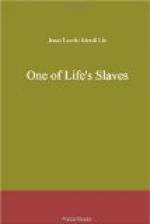Dr. Schneibel talked both kindly and severely, both good-naturedly and sharply: he was almost like a father.
Barbara felt a pang of fear every time she saw him come down the street, and turn in by the rotten, mouldy wooden fence. She watched him like a bird that is afraid for her nest, and was sitting close to the wall in the darkest corner with the cradle behind her, when he opened the door. It was impossible for her to answer except by a sob. The tinsmith’s wife did all the talking with: “Why, bless me, yes!” and “Bless me, no!” and “Just so, doctor!” in garrulous superabundance, while Barbara only sat and meditated on taking her baby on her back and departing.
But to-day the doctor had talked so very kindly to her and offered her so much money. He had appealed so directly to her conscience, patted the child, and said that when it came to the point, he was sure she was not the mother who could be so cruel as to bring misery upon such a pretty little fellow, let him suffer want, let his pretty little feet be cold, when he might lie both comfortable and warm and like a little prince in his cradle!
It was not possible to resist, and in her emotion something like a half promise escaped her.
Afterwards a neighbour came in and was of exactly the same opinion, and told of all the little children whom she had known that had died of want and neglect, only in the houses round about, during the last two years, because their mothers had had to go out and work all day and could not pay any one to look after them. And she and the tinsmith’s wife both spoke at once about the same thing—only the same thing.
Barbara sat listening and tending her child. Her heart felt like breaking. For a moment she thought of going, not to Hoegden, but in another way, home with him at once.
It was a temptation.
That night she broke into sobs so ungovernable, that, in order not to disturb the household in their slumbers, she went out into the soft, drizzling rain: it quieted and cooled her.
As she was standing the next morning, helping a neighbour’s wife to rinse and wring the clothes by the brook, a pony-carriage stopped in the road. The coachman—he had gold lace on his hat and coat—got down and went in to the tinsmith’s.
“You must wring that sheet right out, Barbara,” said the neighbour’s wife; “it’ll be the last you’ll wring here, for that’s the Consul’s carriage.”
And Barbara wrung the sheet until there was not a drop of water in it. It had come now!
She went in and dressed the child; she hardly knew what she was doing, and hardly felt it under her hands.
She saw the man give six dollars to the tinsmith’s wife. He was so stiff and tall and distinguished-looking, with such a big, aristocratic nose, and he made a kind of bend every time she happened to look at him, and assured her that there was no hurry—not the least! They never woke before nine at the Consul’s, so there was still plenty of time. And then he looked at his watch.




